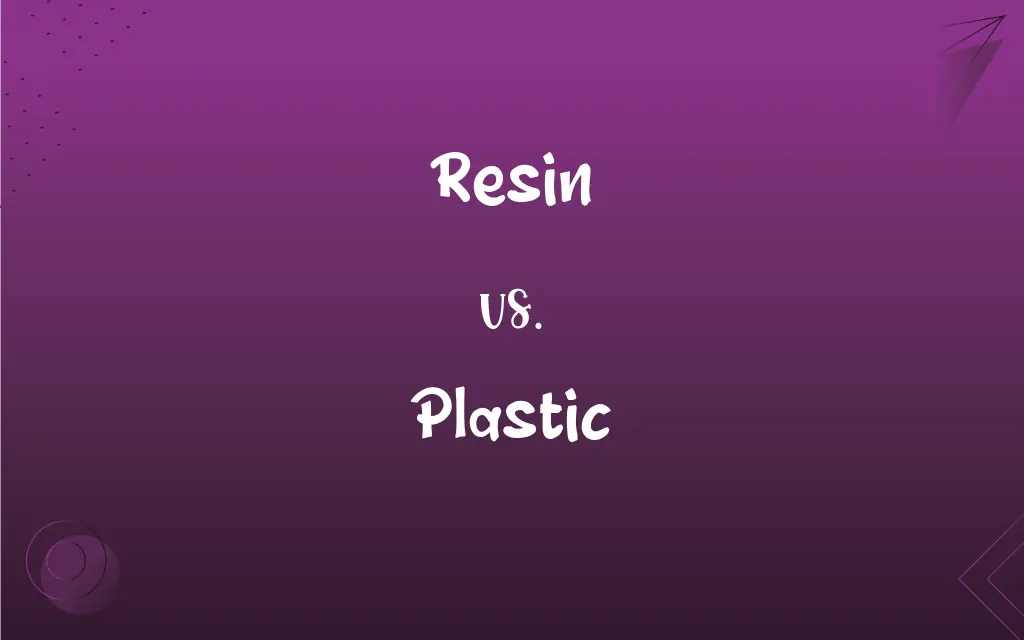Resin vs. Plastic: What's the Difference?
Edited by Janet White || By Harlon Moss || Updated on October 6, 2023
Resin is a sticky, organic substance from plants, while plastic is a synthetic, moldable material created from polymers.

Key Differences
In a basic sense, resin and plastic both possess distinctive characteristics and origins that differentiate them in various applications. Resin, inherently, is an organic substance typically secreted by plants, notably conifers. It is sticky, often semi-solid, and can harden over time or when exposed to air. On the other hand, plastic primarily refers to synthetic, malleable materials created from polymers, presenting a vast array of types and uses across numerous industries.
Exploring the arena of crafting and modeling, resin often is favored for its glossy, clear finish when dried, making it a preferred choice for jewelry, paperweights, and various artistic creations. In comparison, plastic, given its versatile and easily moldable nature, finds broader application in the creation of containers, tools, toys, and numerous everyday objects, providing a somewhat universal presence in modern day living.
The environmental perspectives related to resin and plastic hint at different challenges and considerations. Natural resins can biodegrade, being a product of biological processes, thereby potentially offering a more environmentally-friendly alternative under certain circumstances. Conversely, conventional plastics have garnered widespread concern due to their persistence in environments, often contributing significantly to pollution due to their resistance to biodegradation.
The usage of resin and plastic in technological and industrial applications tells a unique story. Resin is often utilized in electronics, construction, and certain specific applications like surfboard coating due to its insulating and adhesive properties. Plastic, ubiquitous and varied, becomes a vital player in manufacturing, building, and producing an immense array of items, attributed to its ability to be molded into a multitude of forms, sizes, and shapes with relative ease.
In terms of aesthetic and tangible properties, resin might provide a more luxurious or high-quality appearance and feel in certain applications, like epoxy tables or certain kinds of art, given its gloss and sometimes natural origins. Plastics, while diverse, may sometimes convey a more utilitarian or mass-produced image, but it's imperative to note that certain plastic types, such as high-quality acrylics, can also emulate a luxe appearance.
ADVERTISEMENT
Comparison Chart
Origin
Organic, typically from plant secretions
Synthetic, made from polymers
Biodegradability
Generally biodegradable
Typically non-biodegradable
Typical Uses
Art, jewelry, coatings
Containers, tools, toys, myriad of uses
Physical State
Often sticky and semi-solid
Typically solid and moldable
Environmental Impact
Can be lower, especially for natural resin
Often associated with pollution and waste
ADVERTISEMENT
Resin and Plastic Definitions
Resin
In industrial contexts, resin can refer to synthetic products used in various applications.
The workers mixed the resin carefully to prepare it for use in the fiberglass composite.
Plastic
Plastic is a synthetic material known for its malleability and versatility.
The plastic container was easily molded into a variety of shapes during the manufacturing process.
Resin
Resin is a sticky, organic substance often secreted by plants.
The pine tree secreted a thick, amber resin which began to harden in the open air.
Plastic
Plastic often refers to various polymers with a wide array of properties and uses.
Different types of plastic were used to produce everything from bottles to car parts.
Resin
Resin is frequently used in artistic endeavors due to its ability to create a clear, glossy finish.
The artist poured the resin over the table to create a smooth, reflective surface.
Plastic
Plastic can be engineered to exhibit specific properties, such as resistance to heat or chemicals.
The plastic lining of the tank was specifically designed to resist corrosion from the stored chemicals.
Resin
Resins can also act as adhesive agents in various manufacturing processes.
Resin was applied to securely bond the two surfaces together, ensuring a strong hold.
Plastic
Plastic is frequently used in packaging due to its ability to be formed into numerous shapes and sizes.
The cookies were sealed in a plastic wrapper to maintain their freshness.
Resin
Some resins are utilized in technological applications for their insulating properties.
The circuit board was coated with a protective layer of resin to prevent short circuits.
Plastic
Plastic pollution is a significant global issue due to the material's prevalent use and disposal.
The beach cleanup team collected several bags of plastic waste, including bottles and bags.
Resin
Any of numerous clear to translucent yellow or brown, solid or semisolid, viscous substances of plant origin, such as copal, rosin, and amber, used principally in lacquers, varnishes, inks, adhesives, plastics, and pharmaceuticals. Resins are usually insoluble in water.
Plastic
Capable of being shaped or formed
Plastic material such as clay.
Resin
Any of numerous physically similar polymerized synthetics or chemically modified natural resins including thermoplastic materials such as polyvinyl, polystyrene, and polyethylene and thermosetting materials such as polyesters, epoxies, and silicones that are used with fillers, stabilizers, pigments, and other components to form plastics.
Plastic
Relating to or dealing with shaping or modeling
The plastic art of sculpture.
Resin
To treat or rub with resin.
Plastic
Having the qualities of sculpture; well-formed
"the astonishing plastic beauty of the chorus girls" (Frank Harris).
FAQs
Does plastic biodegrade?
Most plastics are non-biodegradable and can persist in environments for hundreds of years.
In what industries is resin commonly used?
Resin is widely used in art, jewelry, construction, and electronics industries.
What is resin?
Resin is typically a viscous substance obtained from plant secretions or synthesized artificially.
Is resin biodegradable?
Natural resins are generally biodegradable, while synthetic ones may not be.
Is resin used in jewelry?
Yes, resin is often used in jewelry for its clarity, color versatility, and glossy finish.
What is plastic?
Plastic is a synthetic, moldable material made from polymerizing organic substances.
Where is plastic most commonly found?
Plastic is ubiquitous and found in numerous industries, including packaging, automotive, and consumer goods.
Can resin be synthetic?
Yes, there are synthetic resins used in various industrial applications.
Are there different types of plastic?
Yes, plastics vary widely, including PET, HDPE, PVC, and many others, each with unique properties.
What are plasticizers?
Plasticizers are additives that increase the plasticity or decrease the viscosity of a material, often used in plastics.
What are the impacts of plastic production on climate change?
Plastic production often involves fossil fuel usage, contributing to greenhouse gas emissions and climate change.
Can plastic be recycled?
Yes, many plastics can be recycled, though the rates and methods depend on the plastic type and local facilities.
Is resin used in 3D printing?
Yes, certain types of 3D printing utilize resin, which is cured layer by layer with light.
What's a well-known problem associated with plastic?
Plastic pollution, particularly in oceans, is a prominent environmental issue.
Is resin flammable?
Resins can be flammable and may release fumes when burned.
Are there eco-friendly alternatives to traditional resin?
Yes, there are bio-resins derived from biological sources that are more eco-friendly.
Are there biodegradable plastics available?
Yes, some plastics are designed to be biodegradable, often incorporating organic materials.
Can resin be colored?
Yes, pigments can be added to resin to create a variety of colors.
How is plastic manufactured?
Plastic is typically manufactured through processes like injection molding, blow molding, and extrusion.
Can resin be used as a coating?
Yes, resin is often used as a protective or decorative coating on surfaces like wood.
About Author
Written by
Harlon MossHarlon is a seasoned quality moderator and accomplished content writer for Difference Wiki. An alumnus of the prestigious University of California, he earned his degree in Computer Science. Leveraging his academic background, Harlon brings a meticulous and informed perspective to his work, ensuring content accuracy and excellence.
Edited by
Janet WhiteJanet White has been an esteemed writer and blogger for Difference Wiki. Holding a Master's degree in Science and Medical Journalism from the prestigious Boston University, she has consistently demonstrated her expertise and passion for her field. When she's not immersed in her work, Janet relishes her time exercising, delving into a good book, and cherishing moments with friends and family.
































































